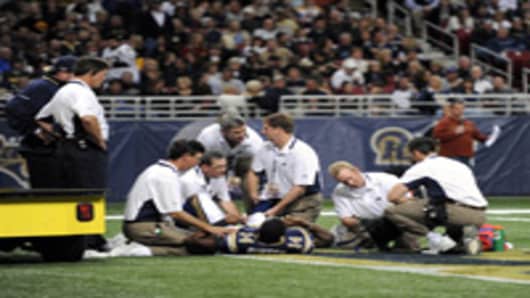It's part of the big numbers that have started to mount over the years since 1974, when Bears star linebacker Dick Butkus won $600,000 for mistreatment of his knees.
Recent hot button cases have dealt with Staph infections and concussions.
Jacksonville Jaguars lineman Jeff Novak won $5.35 million from team doctors after a surgery ended his career due to complications with staph infection and Browns wide receiver Joe Jurevicius is suing the team and its doctors for a staph infection that ended his career.
In 2000, Merril Hoge was awarded more than $1.5 million due to mistreatment of his concussions by a Bears team doctor and a huge case from outside the NFL — a concussion misdiagnoisis that led to a player from LaSalle University being awarded $7.5 million in November — is weighing heavily on the minds of league doctors.
One Los Angeles-based orthopedist who has a sports practice and who has been approached by several sports teams says it's not only not worth it from a malpractice perspective — doctors can't possibly find enough malpractice insurance to cover potential losses if a player sues for a career-ending injury based on his future earning potential — but it doesn't make sense financially.
"It's a pretty big time commitment," said the doctor, who didn't want to be identified. "And they don't pay you much."
"It has become more and more difficult," admitted Dr. Andrew Bishop, an orthopedist who was once the team doctor for the Atlanta Falcons.
Bishop says that the job is an inherent conflict of interest because the doctors often can't have the best interests of the players and the owners at heart.
And players have gotten more skeptical of their care thanks to sponsorship deals, which include about 75 percent of the league's teams.
In this arrangement, a medical organization provides the team doctors often for free and also pays for a marketing arrangement which advertises the deal to fans.
Does the Hospital For Special Surgery in New York really have the best doctors for the Mets, Giants, Knicks, Nets and Red Bulls or is it because they pay for the right to say they treat the teams?
Players have the right to get a second opinion and have their surgery done by doctors other than the team doctor, but the current structure leaves lawsuits as the only way of settling from an unhappy outcome if the team doctor ultimately does the work.
"Everyone has known from the beginning that this job is idiotic from a medical and legal standpoint," said Dr. Robert Huizenga, the Raiders doctor for eight years whose book "You're OK, It's Just A Bruise" was considered the team doctor's version of Jim Bouton's 'Ball Four.' "You are dealing with a group of individuals who have unrealistic expectations and no one is going to insure you for what you're doing."
Huizenga and Bishop see the future of the relationship between team doctors and their high-priced patients only going downhill, unless some major reforms are made.
Both have ideas, but no one has really listened.
Bishop's idea is to have the NFL Players Association at least build up a pool of money that in someway would indemnify team doctors for their services.
Huizenga's solution? Have a team doctor and a player's doctor. The team pays and insures their doctor, the players pay and insure their doctor.
"The players have to know that if they want the best care, they can't see the doctor for free," Huizenga said. "What they want now is a doctor the team supplies and then they want the doctor that's best for them. That can't happen. Obviously the team is incentivized to have the results skew in their favor."
Huizenga contends the players have been "asleep at the wheel" in terms of protecting themselves when it comes to head injuries, drug issues and other ethical issues.
Huizenga says he's particularly concerned about concussions, where the league has long done work, but with little success. In November, the co-chairman of the NFL medical committee studying concussions resigned after Congressional scrutiny.
"It's time to end this farce where the NFL appoints people to do their studies," Huizenga said. "The players have to step up and pay for the work themselves."
Said Huizenga: "When I was done as the team doctor in 1991, I was making $16,000 a year. And there was a line of people waiting to replace me. Those days are over. It just doesn't make sense anymore."
Questions? Comments? SportsBiz@cnbc.com



